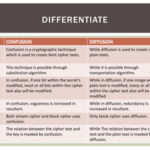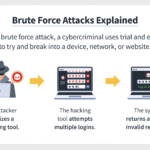As we stand at the precipice of a technological revolution, the advent of quantum computing beckons us to reconsider the very frameworks that underpin our digital security. Just as alchemists of antiquity sought to transmute base metals into gold, contemporary innovators are endeavoring to metamorphose the unfathomable complexities of quantum mechanics into practical applications for data encryption. Yet, as we peer into this kaleidoscope of possibilities, a pressing inquiry looms: Are we truly ready for quantum?
The current era of encryption, primarily dominated by algorithms derived from classical computing paradigms, faces an existential threat from the rapidly evolving capabilities of quantum computers. Traditional encryption methods, such as RSA and ECC, rely on mathematical problems that are immensely challenging for classical computers to solve, akin to trying to traverse an expansive labyrinth without a map. However, quantum algorithms, particularly Shor’s algorithm, offer a shortcut through this labyrinth, enabling a quantum computer to factor large numbers in polynomial time. The implications are profound: what once took centuries could be reduced to mere moments.
The metaphor of an intricate painting comes to mind. Imagine a canvas meticulously layered with colors, representing the vast fabric of our digital existence, where data is cherished and privacy is paramount. Each brushstroke symbolizes a component of our encryption protocols that ensures confidentiality and integrity. However, as quantum computing technology advances, this tapestry of security could be subject to swift and chaotic strokes of a new brush—a quantum brush that can obliterate established norms with sweeping precision.
As we delve deeper into this multifaceted domain, let us first examine the very nature of quantum computing. At its core, quantum computing exploits qubits—quantum bits that can exist in multiple states simultaneously, a phenomenon known as superposition. This is in stark contrast to classical bits, which reside firmly in binary states of 0 or 1. The intricacies of entanglement further compound this complexity, allowing qubits that are entangled to correlate their states irrespective of the distance separating them. This uncanny behavior produces computational power that defies traditional logic and allows for simultaneous calculations on an exponential scale.
To visualize this quantum advantage, consider the difference between a solitary rider traversing a winding road and a fleet of interconnected drones navigating the same path with unparalleled efficiency. Quantum computers are poised to deploy this fleet mentality to deconstruct encrypted data, posing a formidable threat to current cryptographic methods. Yet, the question arises: how do we shield our digital fortress from such a potent adversary?
The field of post-quantum cryptography emerges as a beacon of hope, aiming to develop cryptographic systems that can withstand the tempest that quantum computing promises to unleash. These new algorithms are designed using mathematical functions that exhibit hardness properties, rendering them resistant to quantum attacks. Lattice-based, hash-based, and code-based cryptographic techniques are at the forefront of this evolution, exemplifying human ingenuity in the face of uncertainty.
Envision this transition akin to steeling a medieval castle against an advancing army. The walls must be fortified and new defenses crafted to ensure the safety of its inhabitants. The analogy extends further; the castle makers, akin to cryptographers today, are tasked with not just fortifying against immediate threats but anticipating future assaults from more innovative foes. As research proliferates and the foundational theories of post-quantum cryptography are tested, it is essential to balance innovation with practicality. Transitioning to these new cryptographic standards requires not only robust mathematical frameworks but also widespread consensus, implementation strategies, and interoperability among existing systems.
Yet, despite the promise of post-quantum solutions, an undercurrent of skepticism remains. Each revolutionary stride in technology brings with it a dual-edged sword. First, the realization that quantum computers may not be as arcane as once thought leads us to contemplate the equitable distribution of technological advancements. Will access to quantum computing be democratized, or will it manifest as another form of asymmetrical power, privileging certain entities over others? The nagging fear of a digital divide may polarize society into the haves and the have-nots of quantum capabilities.
Furthermore, the ethical dimensions of accelerating this technological wave cannot be overlooked. Ethical considerations need to be woven into the fabric of quantum computing research and application. The prospect of a technological arms race, akin to the Cold War’s race for nuclear armament, poses ethical dilemmas that demand scrutiny. The race to quantum supremacy should not overshadow the responsibility that comes with wielding such potent capabilities.
As the curtain rises on this quantum era, individuals and organizations alike must engage in a comprehensive dialogue about encryption, trust, and the safeguarding of human rights in the digital realm. Education about quantum mechanics and post-quantum cryptography should permeate the public consciousness, equipping society to navigate the complexities that lie ahead. The conversation should extend beyond technologists and researchers, inviting philosophers, ethicists, and legislators into the fray. Engaging diverse perspectives ensures a holistic approach that recognizes not only the technological challenges but also the societal ramifications of this quantum evolution.
In conclusion, as we edge closer to the quantum precipice, we find ourselves at a crossroads where preparation meets trepidation. The evolution of encryption, much like the waves of the ocean, is both relentless and transformative. Human curiosity propels us forward into uncharted waters. Whether we are ready for quantum largely depends on our capacity to engage thoughtfully with the innovations unfolding around us. Embracing the profound possibilities while remaining vigilant against the potential pitfalls will define the next chapter in our collective narrative of digital security.








Leave a Comment